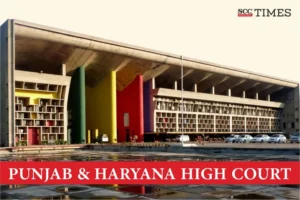Punjab & Haryana High Court: In a writ petition seeking correction of the totaling of the Civil Law-I examination (‘Civil Law paper’); correct evaluation of an answer in the English subject examination ( ‘English paper’) attempted by the petitioner in the Punjab Civil Services (Judicial Branch) Examination 2016, a Division Bench of Sheel Nagu, CJ., and Sumeet Goel, J., allowed the writ petition and ordered re-evaluation of an answer by an examiner different from the one who previously examined for free and fair assessment.
Background
An advertisement inviting applications from eligible candidates for the examination in question was issued by the Punjab Public Service Commission. The petitioner, aspiring to be appointed as a Judicial Officer, applied pursuant thereto and successfully passed the preliminary examination conducted in that regard.
Subsequently, the petitioner appeared in the main examination. The result of the main examination was later declared, but the petitioner did not qualify for the Viva-Voce as per the declared result. The final result of the examination in question was declared on 29-11-2018, which revealed that the petitioner had secured 472 marks in the main examination, whereas the qualifying cut-off for the Viva-Voce was 475 marks.
Dissatisfied with the result, the petitioner obtained copies of his answer sheets in accordance with the applicable rules. Upon perusal of the same, the petitioner identified two issues:
First, a mistake in the totaling of marks in the Civil Law paper, whereby 01 mark had been erroneously omitted;
Second, an answer in the English paper had not been correctly evaluated.
Aggrieved, the petitioner filed the present petition.
Issues
Whether the petitioner deserves to be awarded one additional mark in the Civil Law paper on account of error in totaling.
Whether the answers to the question in issue given by the petitioner in English paper deserve to be got re-evaluated in the factual matrix of the case in hand.
Analysis and Decision
1. Error in totaling in the Civil Law paper
The Court noted that the grievance of the petitioner concerning the error had been brought to the notice of the respondent authorities and was rectified. The petitioner was accordingly awarded one additional mark, and this correction had been duly communicated to him. Hence, this aspect of the writ petition stood redressed and was closed by the Court.
2. Re-evaluation of the answers to questions in issue in the English paper
The Court stated that writing two answers each to three of the total posed idioms is not reasonable and undermines the very sanctity and discipline of the examination process.
The Court about multiple answers opined:
“This stand of the petitioner, when examined on the anvil of common sense and prudence, deserves rejection as it is not reasonable, by any stretch of the imagination, that an examinee can be permitted to write multiple answers on an impulse and then expect the examiner to evaluate all of them to determine the accurate answer”
The Court further stated that accepting such an argument would lead to confusion and arbitrariness, defeating fair assessment, and thus only the first answer ought to be evaluated by the examiner.
Furthermore, the Court, concerning the incorrect evaluation of the first answer, which is correct as contended by the petitioner, referred to the judgment of Jasmine v. State of Haryana1, which dealt with the scope of judicial review in a plea for re-evaluation of an answer given to a subjective/descriptive type of question. The Court emphasised that it is neither intended nor equipped to sit as an appellate body over academic evaluations, particularly when the process involves the exercise of subjective, descriptive and evaluative expertise to exercise the writ jurisdiction under Article 226 of the Constitution.
Concerning the second submission, the Court observed that even on the touchstone of ordinary English usage, the first answer submitted by the petitioner could not be said to be incorrect. The Court further warned against the judicial overreach by stating that the Court cannot arrogate itself the role of the examiner as it would transgress the boundaries of judicial propriety however, recognising a clear ex-facie defect, the Court observed:
“This Court, but of course, cannot turn Nelson’s eye to such an ex-facie defect in the evaluation. Hence, the first answer to the question in the issue calls for re-evaluation.”
Given the above discussions, the Court stated that when evaluation is completely wrong , the preferable and lawful option is not for the court to do evaluation itself. Instead, the matter should be sent back to an equally competent expert or panel of experts, who are not involved in the original process so that the assessment remains fair and without any biasness.
Direction issued
Accordingly, the Court directed the respondents to have the first answer to the question in issue, namely, “Mohan is a painter of the first water” in the English paper apropos the idiom, namely, “of the first water” re-evaluated by an examiner, other than the examiner/evaluator who had previously examined the said answer, by extant procedure and submit (in a sealed cover) the said re-evaluation, for perusal of this Court on or before the next date of hearing.
The matter will next be taken up on 11-07-2025.
[Rustam Garg v. Punjab and Haryana High Court, 2025 SCC OnLine P&H 2759, decided on 27- 05-2025]
Advocates who appeared in this case :
For the petitioner: Petitioner in person
For the respondent: Rajiv Anand and Senior DAG Punjab Salil Sabhlok
1. 2025:PHHC:026023

